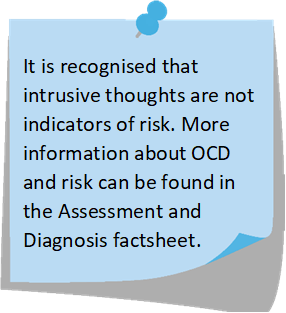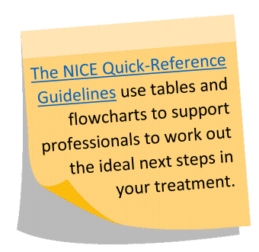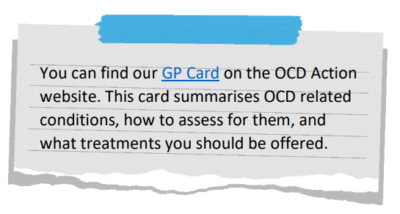.
In most cases, the first step to treatment would be to speak to your GP to discuss what you’ve been experiencing and your options. This can be daunting if you are worried about your condition being misunderstood or you’ve had negative experiences in the past where professionals haven’t offered the right help. The information below can help by explaining what to expect, how to talk about your symptoms, and what information might be helpful to bring along.
.
What to expect
Because of the nature of their role and training, a GP’s areas of knowledge will vary depending on their experience. Whether or not a GP knows much about OCD, they will be aware of mental health conditions and have some training on how to support people with them. In fact, 1 in 4 GP appointments will be about mental health. Sometimes, though, a GP might know quite a lot about OCD and even be the person who recognises the symptoms in the first place.
A GP can prescribe the recommended medication and make a referral for therapy. They can also signpost you to relevant services and organisations, which offer information or non-treatment support like peer groups, befriending, or putting a personal plan together. Your GP should discuss all options with you, and then a decision about how to move forward should be made together. While this does happen in most cases, sometimes there are barriers in place like limits in timing or GP knowledge. On top of reading this factsheet, it can be helpful to read our guides about treatment and the NHS mental health system, in order to go into an appointment with an idea of your desired result.
 On some rare occasions, a GP might be actively unhelpful, providing inaccurate information about OCD and what support is available. This can be very upsetting, especially if you are already feeling doubts about your condition or whether you will be able to recover. This might even cause someone to disengage with the mental health system and not get any support. It is important to remember that help is out there, and that these professionals are an exception, rather than the norm. You do not have to speak to your named GP if you are not comfortable doing so. Instead, you have a right to see any GP within the practice. Sometimes, a surgery will have a GP on staff who is particularly experienced around mental health, so it can be worth it to ask about this.
On some rare occasions, a GP might be actively unhelpful, providing inaccurate information about OCD and what support is available. This can be very upsetting, especially if you are already feeling doubts about your condition or whether you will be able to recover. This might even cause someone to disengage with the mental health system and not get any support. It is important to remember that help is out there, and that these professionals are an exception, rather than the norm. You do not have to speak to your named GP if you are not comfortable doing so. Instead, you have a right to see any GP within the practice. Sometimes, a surgery will have a GP on staff who is particularly experienced around mental health, so it can be worth it to ask about this.
.
Talking about OCD symptoms
One of the most common barriers to getting treatment for OCD is the embarrassment or fear that someone might feel at the thought of telling a professional about their symptoms. It is in the nature of OCD to bring on feelings of shame about not being able to stop compulsions and worrying, so you might be concerned that your GP might dismiss your distressing experiences by saying things like “We all get these kinds of thoughts”, “It’s just anxiety”, or “You’ve just got to try harder”. Many people with OCD will have heard similar things in their lives. Depending on what your intrusive thoughts are about, you might also be worried about a safeguarding report or risk assessment if the GP doesn’t understand that these are unwanted.
Whatever the reason, the good news is that the GP doesn’t need to know the details of what your worries are or what your compulsions look like, because these do not determine whether you are struggling with OCD. Instead, what is important to make clear is that the OCD cycle is present, and how much of an impact it is having on your mental health and day to day life:
- Obsessive thoughts and worries that are automatic, unwanted, irrational, and very difficult to move on from.
- Intense anxiety because of the doubt or sense of danger brought on by these thoughts
- Getting stuck in repetitive actions (physical and/or mental) in an attempt to cope with the anxiety and reduce doubt
As long as these three elements of your symptoms are covered, the GP doesn’t need any more information to make a referral. More information will be needed for assessment and treatment, but this will be offered by the mental health team and should be with a professional who has specific training or experience in working with OCD.
.
Useful information and documents
If someone is asking for mental health support for the first time or hasn’t had any treatment for a while, usually the GP will suggest treatment through the primary care mental health team. They might make the referral themselves or provide contact details to be used to self-refer. The NICE guidelines, though, explain that you should be referred directly to the appropriate level of care, even if you haven’t tried treatment at lower levels in the past.
 NICE is the National Institute for Health and Care Excellence, and any GP will know that these are official guidelines. If a professional refuses to go along with what the guidelines say, this can be appealed or a complaint can be put in. If asked to, the GP must provide a medical reason for refusing, and write this in your medical record..
NICE is the National Institute for Health and Care Excellence, and any GP will know that these are official guidelines. If a professional refuses to go along with what the guidelines say, this can be appealed or a complaint can be put in. If asked to, the GP must provide a medical reason for refusing, and write this in your medical record..
OCD Action also provides information about treatment, referral pathways, and the mental health system. Although they are not official documents in themselves, all the
information within our factsheets comes from the NICE guidelines and/or expert clinicians who run the NHS’s specialist OCD treatment services. GPs and other professionals are also welcome to call our helpline if they are unsure of anything, although they should also be looking at the guidelines or speaking to colleagues who have knowledge about OCD.


